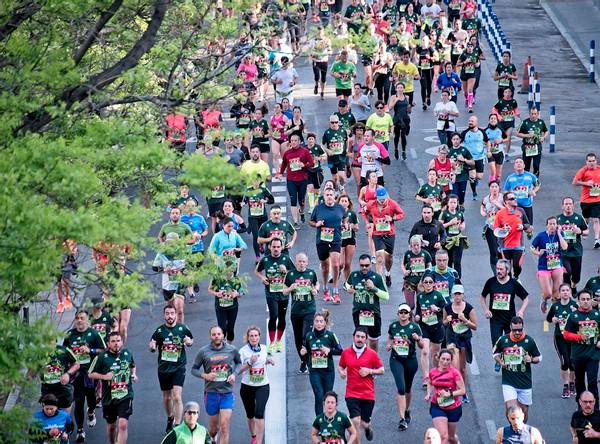Explore the World's Best Ideas
Join today and uncover 100+ curated journeys from 50+ topics. Unlock access to our mobile app with extensive features.
Keep your motivation in sight
For many runners, the desire to do a marathon is about personal challenge. You might want to test your limits or prove that you can go the distance. Maybe you'd like to lose weight, get healthier or raise awareness for a charity.
Whatever your reason, hold on to it and remind yourself of it often during the months that lie ahead.
33
299 reads
Getting started
- Be aware of your limits. Consult with your physician before embarking on any training program.
- Start early: as an aspiring marathoners, run a consistent base mileage for at least a year before embarking on a marathon training program.
- Start small: Running a few shorter races—5Ks, 10Ks, or even a half marathon—is an excellent way to prepare physically and mentally for a first marathon
31
275 reads
One of the most common causes of injury
A common cause of injury is building weekly mileage too soon, too fast.
So don't underestimate the importance of consistently running at least 20–30 miles a week regularly before committing to training for a marathon.
32
290 reads
The primary elements of marathon training
- Base mileage. Build your weekly mileage over time, running 3-to-5 times per week.
- The long run. Do a long run every 7–10 days so your body can adjust gradually to long distances.
- Speed work. Practice intervals and tempo runs to increase your cardio capacity.
- Rest and recovery. Adequate rest helps prevent injuries and mental burnout.
42
267 reads
Hydration
Nearly all marathons include water and aid stations along the way. But if you plan to carry some of your own water on race day:
- Buy a hydration pack or belt, or carry your own water using with handheld bottles.
- Do long runs on a short loop course, so you can stash water in one spot along the way.
- Plot your long run route to pass water fountains.
- Stash water bottles along your route the night or morning before your run.
32
236 reads
Fueling
For any run over 2 hours, aim to take in about 60 grams of carbohydrates per hour.
As glycogen (primary source of energy during the marathon gets depleted over the course of your marathon, your muscles will begin to tire and feel heavy. While no amount of fuel consumption during the race can entirely replace your depleted glycogen, consuming small amounts of carbohydrates can help prevent you from hitting the dreaded wall.
36
223 reads
Don't try anything new on race day
No new shoes, new shorts, new shirt, new hydration pack/belt or new foods.
Don't drink 3 cups of coffee if you usually have one. Your long training runs are when you should be fine-tuning your clothing, gear and fueling strategies.
33
230 reads
Before the race
- Hydrate well for several days leading up to your marathon.
- Eat a simple, high-carbohydrate breakfast several hours before the start of the race.
- Lather up with a little Vaseline or BodyGlide in any areas vulnerable to chafing.
- The temperature is apt to rise over the course of the race, so don't overdress.
- If you plan to run with music, check ahead of time whether headphones are allowed on the course; not all marathons permit them.
31
212 reads
During the race
- Start slowly - starting too fast is a big rookie mistake.
- Don't blaze by every aid station or try to drink from a cup while running full blast.
- Bathroom lines are longest at the first few aid stations. If you can wait another couple miles without discomfort, it may save you time.
- Enjoy the energy of the spectators.
30
220 reads
Race recovery and beyond
Race day:
- Drink several cups of water or sports drink. Walk a little, if you can, to let those muscles cool down. Do gentle stretching. Eat some simple carbohydrates, whether you feel like it or not.
After race day:
- Take at least a week off before resuming any kind of regular running schedule.
- Get plenty of sleep. Eat well-balanced meals. Take care of any injuries or ailments you may have developed during the race.
34
226 reads
IDEAS CURATED BY
Orla Braun's ideas are part of this journey:
Learn more about exerciseandfitness with this collection
Proper running form
Tips for staying motivated
Importance of rest and recovery
Related collections
Similar ideas
12 ideas
An Absolute Beginner's Guide to Becoming a Runner
verywellfit.com
4 ideas
How to Avoid Injuries as a Beginning Runner
vitals.lifehacker.com
1 idea
How To Start A Daily Running Habit - Darius Foroux
dariusforoux.com
Read & Learn
20x Faster
without
deepstash
with
deepstash
with
deepstash
Personalized microlearning
—
100+ Learning Journeys
—
Access to 200,000+ ideas
—
Access to the mobile app
—
Unlimited idea saving
—
—
Unlimited history
—
—
Unlimited listening to ideas
—
—
Downloading & offline access
—
—
Supercharge your mind with one idea per day
Enter your email and spend 1 minute every day to learn something new.
I agree to receive email updates





